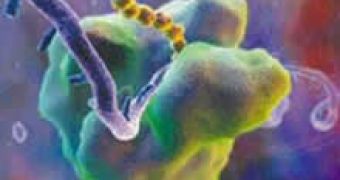The cellular process of transcription, in which the enzyme RNA polymerase constructs chains of RNA from information contained in DNA, depends upon previously underappreciated sections of both the DNA promoter region and RNA polymerase, according to work done with the bacterium E. coli by a team of bacteriologists from the University of Wisconsin-Madison. This fundamental research about a key step in RNA synthesis has important implications for the study of gene expression in other organisms, and adds to the wealth of knowledge about E. coli.
"The kinds of processes that we study in E. coli happen in a wide variety of bacteria of medical, environmental and agricultural importance," notes Rick Gourse. "This knowledge can ultimately be put to use in systems that aren't so amenable to investigation, such as bacteria that cause cholera, produce anthrax toxin or lead to ulcers and stomach cancer."
Scientists use model organisms such as E. coli because they are relatively easy to work with and because there is a vast amount of previous knowledge about them. They can then test whether their findings in model organisms hold true in other species, says Gourse, who studies a strain of E. coli that while harmless, is closely related to disease-causing varieties like E. coli 0157:H7.
"Basic research in E. coli is very important," says Gourse. "Much of what we know about gene expression both in bacteria and in higher life forms comes from work performed originally on this model organism."
In his most recent study, Gourse investigated the interaction between RNA polymerase and promoters from the E. coli chromosome. RNA polymerase reads the information in DNA and transcribes it into chains of RNA, which are later translated into proteins. Promoter regions are specific sequences within the DNA chain that tell RNA polymerase when and where to begin transcription, and how much product to make from specific genes.
Gourse's group found that there is a specific region within DNA promoters that makes contact with a highly conserved but previously underappreciated segment of a certain subunit of RNA polymerase. "In this case, regulation is achieved not because the promoter makes a special contact, but because it can't establish contact at all," says Gourse. "This is an example of how sometimes less is more, and a probably very ancient example of one of the methods that arose through evolution to regulate gene expression."
Ribosomal RNA makes up the bulk of ribosomes, the molecular machines that make proteins and are present in huge numbers in all cells. Since so much of the cell's energy is used to make ribosomes, control of ribosomal RNA transcription is particularly crucial to a cell's well-being.
"This work is basic to the growth of all bacteria," says Gourse. "By understanding transcription and control of ribosome synthesis in E. coli, we can understand more about these processes in bacterial species that we need to control, like those that cause disease or make toxins. E. coli is also the workhorse of the biotechnology industry. Understanding E. coli gene expression in detail allows us to harness these cells for producing products of biotechnological importance, like pharmaceuticals."

 14 DAY TRIAL //
14 DAY TRIAL //